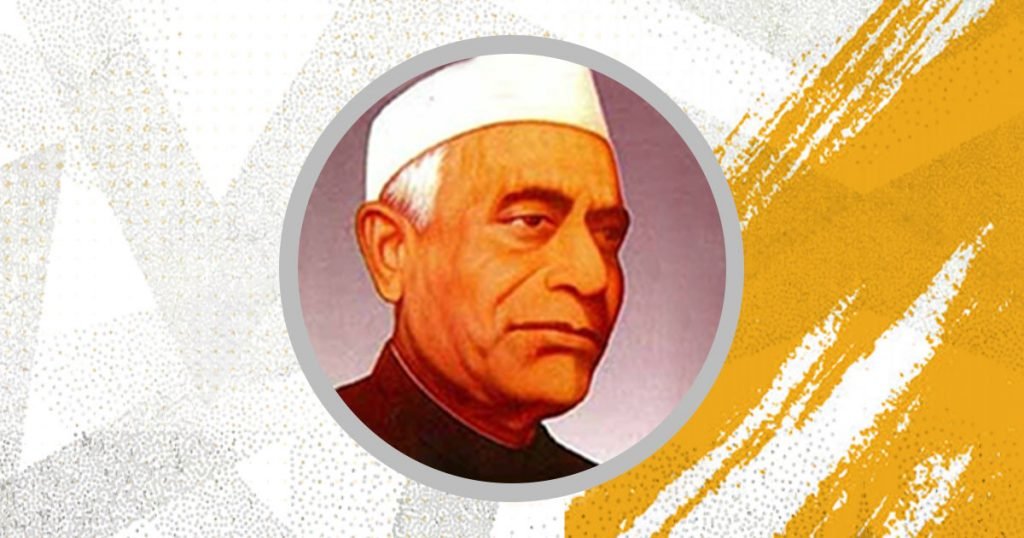हे प्रभो आनंददाता ! ज्ञान हमको दीजिए,
शीघ्र सारे दुर्गुणों को दूर हमसे कीजिए।
लीजिए हमको शरण में, हम सदाचारी बनें,
ब्रह्मचारी, धर्मरक्षक, वीरव्रत धारी बनें।

Ramnaresh Tripathi (March 4, 1989) was a poet of the Hindi-language ‘Chhayawad Yuga’. He wrote poems, stories, novels, biographies, memoirs, children’s literature. In 72 years of his life, he wrote about a hundred books. He was the first Hindi poet to compile the songs of the village, which is known as ‘Kavita Kaumudi’. For this important work, he went from village to village, sitting in the backyard of the houses all night and he listened to the songs of Sohar and Vivah. He was deeply influenced by Gandhi’s life and work. He said that Gandhiji’s love for me is ‘love for Larkai’ and my entire feeling has been created by the Satyagraha era. ‘Ba Aur Bapu’ is the first Hindi drama written by him.
Born in a farmer family, March 4, 1889 in village Koiripur in Sultanpur district of Uttar Pradesh, Ramnaresh Tripathi’s personality and work was very inspiring. His father Pt. Ramdutt Tripathi was a religious and virtuous Brahmin. The blood of Pandit Ramdutt Tripathi, who held the rank of Subedar in the Indian Army, flowed in the veins of Pandit Ramnaresh Tripathi as a spirit of purity, duty and patriotism. The qualities of perseverance, courage and confidence came from his family.
Pt. Tripathi did his primary education in the village’s primary school. After passing junior classes, he went to high school to study in the nearby Jaunpur district, but could not complete his tenth standard. At the age of eighteen, he moved to Calcutta after a disagreement with his father.
In Pandit Tripathi, his interest in poetry was aroused while receiving primary education. Due to contagious disease, he could not stay in Calcutta for long. Fortunately, following the advice of one person, he went to Seth Ramavallabh Navariya in Fatehpur village of Sikar Thikana in Jaipur state for health improvement.
It was a coincidence that in a morbid condition he did not go to his home family and along with an unfamiliar family moved to a remote unfamiliar place in Rajputana where he soon got rid of the disease after receiving treatment and a healthy climate.
Pandit Tripathi skillfully handled the education of Seth Ramavallabh’s sons. During this time, his compositions were praised by Maa Saraswati and he composed a unique composition like “O Prabhu Anandadata, Gyan Humko Dev”, which is still sung in many schools as a prayer.
Tripathi ji is considered a versatile litterateur. All the major trends of Dwivedi era are found in his poems. After the beginning of Pandit Tripathi’s literary practice in Fatehpur, he wrote a number of short-lived Balopayogi poetry collections, social novels and Mahabharata in Hindi in those days. He made a thorough study of the entire literature of Hindi and Sanskrit. Tulsidas and his immortal creation Ramcharit Manas had a deep influence on Tripathi ji, he wanted to take Manas from door to door. Badhab Banarsi said about him.
In the year 1915, Pandit Tripathi went to Prayag with a wealth of knowledge and experience and made the same field his field of work. With a little capital, he also started the publishing business. Pandit Tripathi left no corner of prose and poetry and carried forward the compositions keeping in mind the law of originality. In the Hindi world, he was a leading litterateur and became popular all over the country.
In the year 1920, he composed the first and best national part of Hindi, “Pathik” in 21 days. In addition, “Milan” and “Sapna” are also included in his famous seminal sections. Dream Photos is his first story collection. He also edited and published seven large and unique collections of poetic poetry.
Pt. Tripathi was not only rich in pen but also a Karmashur. On the instruction of Mahatma Gandhi, he went to South India as the envoy of the Hindi world as the propaganda minister of the Hindi Sahitya Sammelan. He was a staunch Gandhian patriot and a national servant. He also went to jail by participating in freedom struggle and peasant movements.
Pt. Tripathi did not receive any state honors during his lifetime, but more than that, the most prestigious public honor and Akshay Yash would have rained on him. He breathed his last on January 16, 1962 at his place in Prayag.
After the death of Pandit Tripathi, today the only Pandit “Pandit Ram Naresh Tripathi Auditorium” is established in his home district Sultanpur, which brings back his memories.

